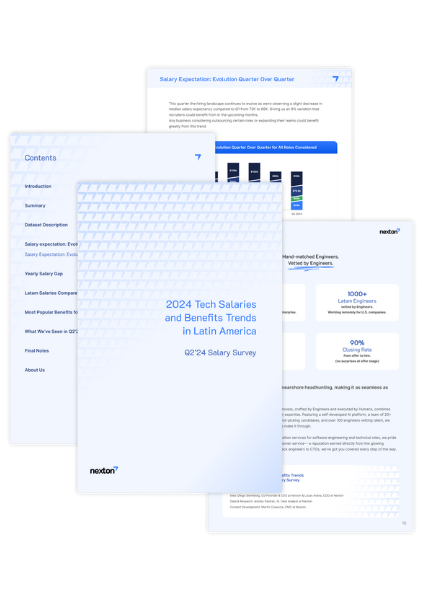If you hire remote engineers from Brazil, you can bring innovation for new insights and increase cultural diversity at your company. However, you should keep in mind that to hire remote engineers, you’ll also require a bit of knowledge about the employment legislation system. The main rules are set around the Consolidation of Labor Laws (Consolidação das Leis Trabalhistas), known as CLT. Beyond them, the process involves reviewing documentation and, if you’re looking to hire an employee and not an independent contractor, you’ll have to deal with providing visas.
However, the employer-and-employee relationship can take place through remote work which keeps the doors open for new talent. Thanks to technology, companies worldwide can be assisted by full-time workers, freelancers, or contractors no matter where they are. In this article, we’ll explore the main points about labor laws and contractors to hire remote engineers based in Brazil. Check it out!
How do I hire remote engineers based in Brazil?

The first step before to hire remote engineers in Brazil begins with a dive into the local labor laws, since the country holds very detailed employment legislation. The system includes different kinds of contracts with particular taxes, entitlements, and collective bargaining.
The Consolidation of Labor Laws is the most common bond between a team member and their company. It means working on the books and following a series of rules. Another recurrent model —often adopted by local and international businesses— is self-employed, which encompasses freelancers and independent contractors.
Whether temporary or permanent, non-remote positions require a work permit from the General Coordination of Immigration and the Work Permit Application Form. This step can be skipped when a company comes from one of the MERCOSUR countries. Lastly, a multi-currency account can help with single payments or batches.
8 things to consider before you hire an employee in Brazil
Most Brazilian workers follow the CLT rules while keeping their occupation, payroll data, salary, benefits, and social security contributions recorded. Here are seven mandatory entitlements that take part in the Consolidation of Labor Laws:
- 13th salary: an extra payment that works like a bonus by the end of every year;
- FGTS: the abbreviation stands for Federal Severance Pay Fund (Fundo de Garantia por Tempo de Serviço). It's a fund managed by a bank, under government supervision, to support dismissals without a cause;
- Minimum wage: minimum amount paid to employees in Brazil. It's adjusted annually and can add collective labor agreements;
- Work hours: eight hours per day or 44 hours per week is the standard work hours adopted. Overtime applies an additional 50% of the regular rate. For Sundays, there is a special permit to work and the other changes to 100%;
- Paid vacation: 30-day vacation —that can be divided into up to three periods— with a bonus (⅓ of the monthly salary) after one full year of employment;
- Profit-sharing: a percentage of the business' profit;
- Remunerated weekly day off: 24-hour paid rest each week, usually on Sundays. Otherwise, employees need a special permit to work, plus an additional 100% of the regular rate;
- Social Security contribution: compulsory payments, according to the employers' activity, to the National Institute of Social Security (Instituto Nacional do Seguro Social). In return, the employee receives a social benefit in the future.
Collective bargaining
Other entitlements include benefits that follow collective bargaining agreements to increase income. Mothers can receive a maternity license for up to 120 days off, while fathers can enjoy five paid days off when a baby arrives. Employees tying the knot can ask for a wedding license and take three days off. There are also transportation and meal vouchers, health care, and Brazilian holidays.
The simplest solution to avoid navigating the world of international hiring laws is to hire independent contractors or to hire a third party to take care of your international payroll.
Can I hire remote engineers in Brazil?

Yes! You can hire remote engineers in Brazil while running a business from another country. If you want to expand your global workforce —through remote workers or international contractors– keep the local labor laws in mind. When you do so, it can be beneficial to your company since foreign team members add innovation, diversity, and refreshing insights. You can:
- Set up a legal entity in Brazil to establish a local branch and hire directly. This option is a good alternative for large teams, but it requires a lot of work on your part;
- Partner with an employer of record to receive support (risk mitigation, taxes, and compliance with local labor laws) while you hire remote engineers in Brazil.
What is an independent contractor in Brazil?

As the name suggests, an independent contractor has complete independence to work. This professional can act with flexibility and freedom to determine how to do the job, though it depends on the contract you choose to create between both parties. It's also a way to test the Brazilian market before going onboard. Through this, you can hire remote engineers for short-term or specialized projects.
An expansion is not complete without the right resources for payments using different currencies. Fortunately, there are many resources you can use to understand international hiring, as well as international transfers.


